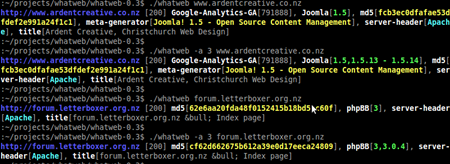 |
 |
 |
 |
 |
  |
|||||||
 |
 |
|
 |
||||
|
Whatweb
A next generation website identification scanner. With stealth-mode turned all the way up to 11 it's less intrusive than the Google crawler and eminently suitable for large scale internet scanning.
Whatweb has been coded to Identify content management systems (CMS), blogging platforms, stats/analytics packages, javascript libraries, servers and more.
WhatWeb has over 60 plugins and needs community support to develop more. Plugins can identify systems with obvious signs removed by looking for subtle clues. For example, a WordPress site might remove the tag <meta name="generator" content="WordPress 2.6.5"> but the WordPress plugin also looks for "wp-content" which is less easy to disguise. Plugins are flexible and can return any datatype, for example plugins can return version numbers, email addresses, account ID's and more.
There are both passive and aggressive plugins, passive plugins use information on the page, in cookies and in the URL to identify the system. Aggressive plugins guess URLs and request more files. Plugins are easy to write, you don't need to know ruby to make them.
Released 29th November, 2009 at the Kiwicon conference (kiwicon.org) in Wellington, New Zealand
Available from here
Pre-requisites
Installation
Ubuntu Linux
Ubuntu 9.04, 9.10, etc. Install RubyGems
For BackTrack 4 BETA, Ubuntu 8.04, etc wget http://rubyforge.org/frs/download.php/45905/rubygems-1.3.1.tgz
Note: - Warning this will remove all your gems
Install Anemone, Spidering library sudo gem install anemone
Execution
whatweb [options] <URLs>
--colour=[WHEN],
Expected Output:
|
IT Security News:
Pen Testing Framework:
Information:
|
||||||||||||||||||||
| © VulnerabilityAssessment.co.uk 08 December 2009 |
|


